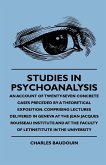This is Part I of a fascinating insight into the history of psychological theory by American psychologist William James. "The Principles of Psychology" will appeal to those with an interest in the history and development of modern psychology and related techniques. Contents Include: "The Scope of Psychology", "The Functions of the Brain", "On Some General Conditions of Brain-Activity", "Habit", "The Automaton-Theory", "The Mind-stuff Theory", "The Methods and Snares of Psychology", "The Relations of Minds to Other Things", "The Stream of Thought", "The Consciousness of Self", etc. Many vintage books such as this are increasingly scarce and expensive. It is with this in mind that we are republishing this volume now in an affordable, modern, high-quality edition complete with a specially-commissioned new biography of the author.
Bitte wählen Sie Ihr Anliegen aus.
Rechnungen
Retourenschein anfordern
Bestellstatus
Storno








